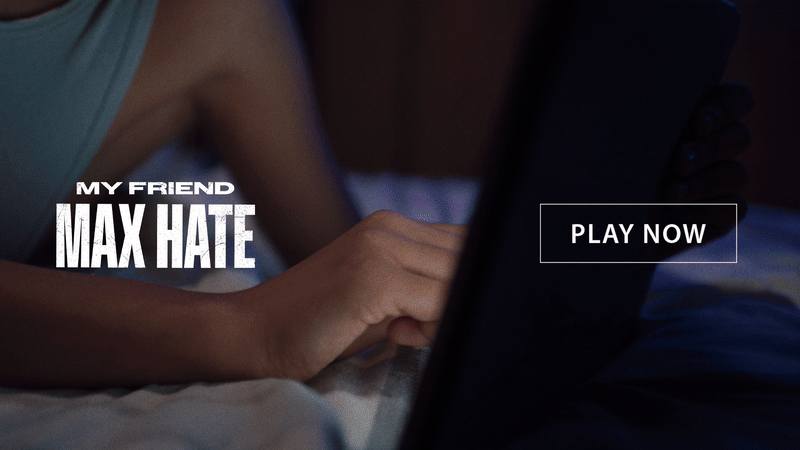49% of parents are unaware of hateful and sexist content targeting boys
Today, many young men and boys are grappling with uncertainty. As traditional ideas of masculinity shift, educational gaps widen, and the digital age leaves us more disconnected than ever, a growing number of boys are feeling lost and adrift.
Amid this vulnerability, harmful and misogynistic content is intentionally targeting them. These messages don’t just catch their attention—they shape their beliefs, fuelling anger, confusion, and isolation.
In our latest campaign, My Friend Max Hate, we shine a light on how predatory online personalities groom vulnerable boys, cloud their thinking with toxic ideologies, and turn them into resentful, misogynistic, and often violent men.
Our mission is twofold: to expose the tactics of these harmful influencers and to provide boys, men, parents and educators with tools to recognize and counteract hateful content. Together, we aim to foster a healthier vision of masculinity—one grounded in respect, empathy, and equality.
Help us spread awareness of the Manosphere’s dangers.
Hate Terminology
Join us in challenging hate. By understanding concepts like these, we can foster critical thinking, enhance media literacy, and encourage open conversations about healthy masculinity.
Manosphere
A loose network of online communities that promote outdated notions of masculinity, anti-feminism, and anti-LGBTQ sentiment, often including explicit violent rhetoric toward women, girls, and trans and gender diverse people.
These groups often spread conspiratorial and extremist messages, blaming women and feminism for men’s personal and societal struggles.
The Red Pill
A term borrowed from The Matrix film, where taking the red pill symbolizes awakening to the "truth" of the world. In the manosphere, influencers distort this concept, claiming the "truth" is that men are under attack in modern society. They use this narrative to lure vulnerable boys and men into a spiral of misogyny and, in extreme cases, violence against women.
Hustle bros
A subset of manfluencers who frame the relentless pursuit of wealth as the foundation of masculinity and self-worth. They often promote get-rich-quick schemes intertwined with misogynistic beliefs, selling a model of hyper-masculinity. While this content may motivate some individuals, it frequently reinforces male supremacy and encourages toxic, and at times violent, behavior toward women. Grooming
The deliberate targeting and manipulation of impressionable individuals to adopt specific beliefs or ideologies. This often focuses on young men grappling with loneliness, insecurity, bullying, or rejection, under the guise of "empowerment" or providing solutions to their struggles.
Misogyny
Refers to the dislike, contempt, or ingrained prejudice against women, trans, and non-binary individuals, rooted in the belief that they are inherently inferior to men. It manifests through discriminatory attitudes, behaviors, or systems that marginalize, devalue, or harm these groups.
Rabbit Hole
An analogy for the journey of radicalization within the manosphere. By joining online forums or communities, individuals find their shared grievances and beliefs reinforced through repetition and validation. Algorithms amplify this echo chamber, gradually normalizing misogyny, anti-feminism, and even violent ideologies, drawing users deeper into the manosphere while isolating them from differing perspectives.
A Rabbit Hole to Isolation
Few men set out to become hateful misogynists. But within the manosphere, they’re gradually exposed to radical beliefs. Over time, they too become victims drawn into male supremacist ideals, cutting themselves off from the world in complete isolation.
How radicalization happens in the manosphere:
Entry Points: Boys and young men often enter the manosphere looking for advice on dating, self-confidence, or fitness. Initially, the content seems harmless—relatable or mildly critical of societal norms.
Gradual Exposure to Extremes: Over time, content takes a darker turn, portraying men as victims of feminism or societal bias. This "us vs. them" narrative, amplified by algorithms, traps users in a feedback loop of increasingly radical material
Community Validation: Forums and social media groups provide a sense of belonging, validating grievances and reinforcing misogynistic ideas. This acceptance is a powerful draw, reshaping their beliefs over time.
Polarization: As users adopt extreme worldviews, they begin to see women, feminists, and society as enemies. Empathy disappears, replaced by absolutist narratives fueled by anger and generalizations.
Isolation: The manosphere’s echo chambers cut users off from differing perspectives. Rigid ideals of masculinity demand stoicism and independence, leaving men isolated, disconnected, and suffering in silence.
Empathy Breeds Empathy
Boys and young men are most vulnerable to being pulled into manosphere, especially when they feel insecure, rejected, or unsupported. By creating a world where they can feel valued, heard and respected, we can prevent them from falling into hateful online communities.
Tips to keep boys safe from the manosphere:
-
Create a safe space for boys to discuss their online experiences and pressures to conform to hyper-masculine ideals. Acknowledge feelings of insecurity or rejection and encourage discussions that help them process these emotions.
-
Teach boys to recognize when they are being manipulated or drawn into echo chambers, that promote harmful hyper-masculine ideals. Not all messages about masculinity are true.
-
To challenge influencer’s hyper-masculine ideals, help boys’ express emotions in healthy, constructive ways, challenging the idea that vulnerability is a weakness, and normalize discussions of insecurities and self-worth.
-
Share stories that humanize those targeted by hate, while also helping them empathize with other men struggling under toxic masculine expectations. This dual perspective fosters compassion and a deeper understanding of healthy relationships.
-
Boys are seeking male role models. Introduce them to figures who challenge unhealthy masculinity and exemplify values like respect, kindness, vulnerability, and resilience.
-
The manosphere is obsessed with quick success. Focus on personal progress and learning, showing that failure is a valuable part of growth.
-
Support activities that build confidence and foster community while challenging traditional notions of masculinity. Encourage them to explore interests that expand their sense of identity beyond stereotypes.
-
Keep an open dialogue about their digital habits without being overbearing. Stay aware of the influencers and platforms they engage with, particularly those promoting hyper-masculinity.
-
Challenge narrow ideals of masculinity, emphasizing that masculinity comes in many forms. Help boys and young men feel good about their unique qualities, from their bodies to their personalities and passions.
-
Support activities and friendships that expose boys to different perspectives, fostering understanding and appreciation for all genders and identities.
Out of the Rabbit Hole
Within the depths of the manosphere, boys and men feel trapped and isolated from the world. But with empathy and compassion, it’s never too late to help them reconnect and begin to heal.
Tips to bring boys out of the manosphere:
-
Create a safe, non-judgmental space for boys to share frustrations on expectations of masculinity. Acknowledge their struggles and guide them toward growth and resilience.
-
Help boys explore why they’re drawn to certain influencers or ideas, uncovering unmet needs and fostering healthier masculinity perspectives.
-
Offer diverse, positive examples of masculinity that value kindness, collaboration, and emotional strength to counter toxic narratives.
-
Gently challenge harmful ideas about gender and power. Show that rejecting toxic beliefs doesn’t mean rejecting their value or masculinity but rather allows for personal growth and healthier relationships.
-
Affirm their worth outside masculine stereotypes, celebrating their unique talents and interests without framing discussions as an attempt to “fix” them.
-
Promote inclusive activities and friendships to counter isolation and hateful online ideologies.
-
Equip boys to spot manipulation and bias in content that promotes discriminatory and hateful ideologies.
-
Encourage boys and young men to see the world through others' perspectives, countering messages that equate dominance with masculinity.
-
Connect boys with mentors or groups promoting positive masculinity and inclusive gender discussions.
-
Understand that unlearning toxic narratives about masculinity takes time. Celebrate small steps toward embracing a healthier and more inclusive view of themselves and others.
Learn more about how you can be part of creating change and fostering allyship
Donate
Please donate to help us continue our mission of building a new vision of masculinity to end gender-based violence.
Need help?
Visit our helpful resources for more information and support for you, your loved ones, and your community.










